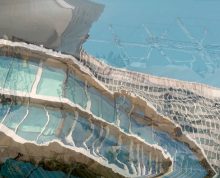As part of the project Precarious Pavilions, curated by Michiel Vandevelde and produced in collaboration with the Kaaitheater, The New Local inquires what a progressive locality in the light of the present global precarities could entail and focuses on the role spatial practice might take within this context. It departs from the premise that both the origin of alternatives and our capacity to create them as a means to address the current precarity are embedded in a tradition based on a Western human-centered ontology, focusing on “control.” The New Local provides a context in which to question and challenge this way of thinking and this form of knowledge (production) and search for new ways of experiencing the dialectic between the local and the global.
This exercise is localized through the Muntplein in the center of Brussels. The Muntplein was designed to serve as a backdrop for events, which resulted in an open, bare square. It lies on the intersection of two shopping streets, and its non-identity was soon filled in by the aura of consumerism. This has recently been accentuated and reinforced by the arrival of the shopping mall “The Mint,” whose display windows face out onto the square.
Between five and ten artists have been commissioned to develop an experiment on the Muntplein. Instead of organizing just another event on the square, these interventions take place during the day without an audience. The interventions will be “documented” and “mapped” in different ways and subsequently presented and discussed as part of an evening program in a dialogue between the artists and invited guests. These public moments take place in venues surrounding the square. All of the interventions have at their core the relationship between the local and the global, and the ways in which this can be experienced on different (temporal and spatial) scales: they are approached by each artist from a distinct angle, offering a variety of opinions and approaches. As such, the project is not designed to seek clear-cut answers or a deployable and hence marketable narrative. On the contrary, we emphasize the need to let go of normalized patterns of relating to “our” world—even though this requires time and the acknowledgement that the right words, language, notions, or infrastructure may not yet exist.


